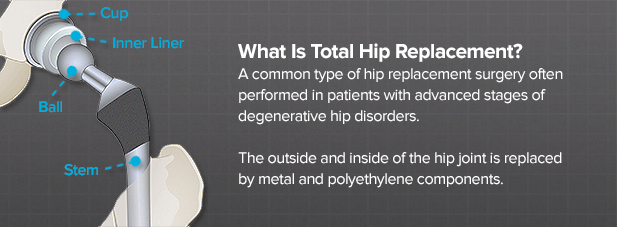
According to the Agency for Healthcare Research and Quality, more than 285,000 hip replacements are performed each year in the United States. In addition, total hip replacements are one of the most successful procedures in all of medicine.1
If non-surgical treatments are no longer enough to allow you to perform your daily activities, your doctor may recommend total hip replacement surgery or hip resurfacing. During a Total Hip Replacement (THR, also known as total hip arthroplasty), your surgeon restores hip function by replacing damaged joint parts with metal and polyethylene implants.
There are many different types of implants. Your surgeon will discuss with you the type of implant that best meets your needs. Your surgeon may opt to use digital templating software to help pre-operatively plan your operation and calculate which implant is best for you.
Total hip replacement is considered when conservative treatments fail to provide adequate pain relief. For many patients with advanced joint disease a total hip replacement offers a realistic chance for long-term pain relief from severe hip pain and a return to normal activities.
You may take comfort to know that, according to the American Academy of Orthopaedic Surgeons, approx. 80% of modern total hip replacements are still functioning 20 years after surgery.2
People who benefit from THR often have the following symptoms:
Understand software-guided hip surgery »
Prepare for the before and after of hip surgery »
Explore digital templating software »
1 American Academy of Orthopaedic Surgeons (AAOS)
2 American Academy of Orthopaedic Surgeons (AAOS)